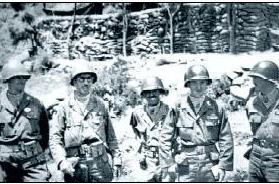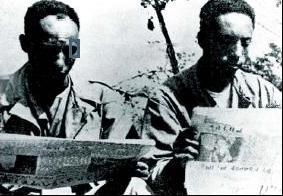[일반] June 14, 2010 The Korea Herald/16 U.N. allies who fought along with S. Korea (II)
- Writeradmin
- Date2010-06-14 14:50:37
- Count2917
16 U.N. allies who fought along with S. Korea (II)
Greece
Greece, located in southeastern Europe, dispatched 840 infantrymen of the Royal Hellenic Battalion and one transport plane squadron to help South Korea during the Korean War. The battalion arrived in the southeastern city of Busan on Dec. 9, 1950. Once equipped and trained, it was assigned to the 7th Cavalry Regiment of the 1st U.S. Cavalry Division.
Greek soldiers demonstrated their combat capabilities when they were defending Hill 381 near Icheon. They also played a key role in the battle of Hill 313 in Yeoncheon, during which the Greek Battalion fought against enemy units under the command of the Chinese Communist 141st Division and the 140th Division.

U.S. Gen. Maxwell Taylor presents the colors of the Greek military.
Greece also sent the 13th Greek Air Transport Flight, which supported the battle of the Changjin Reservoir after it arrived in Japan on Dec. 1, 1950. It supported the U.S. marines and played an important role in bringing back casualties from the front.
A total of 192 Greek soldiers were killed in action during the Korean War.
After the cease-fire agreement, the Greek air force was withdrawn in May 1955 and ground troops in December 1955. (hayney@heraldm.com)
Colombia
Colombia was the only country in Latin America that dispatched troops to fight alongside South Korea during the Korean War.
Upon receiving the U.N. resolution to dispatch troops to Korea, Colombia declared that it would send an army battalion and a frigate ship. However, their financial difficulties at home delayed actual dispatch of troops and they had to negotiate with the U.S. on matters of weaponry, training and supply. Colombia first sent naval war vessels, and later sent ground troops to Korea on June 16, 1951. Among the U.N. member nations, these troops were the last to arrive in Korea.

Top officers of a Colombian battalion pose for a photo. The U.N. Memorial Cemetery in Korea
France
Among European countries, France, the Netherlands and Belgium dispatched infantry battalion-level troops to Korea.
Consisting of 39 officers, 172 non-commissioned officers and more than 800 enlisted personnel, the French Battalion departed Marseilles on Sept. 25, 1950, arriving in Busan on Nov. 30, 1950. After receiving U.S. weapons and vehicles, the battalion was attached to the 23rd Infantry Regiment of the 2nd U.S. Army Division, with whom it served until the end of the hostilities on July 27, 1953.
In particular, the French Battalion demonstrated their bravery at the battle of Chipyongri in February 1951, and after this battle the U.S. soldiers of 23rd Infantry Regiment came to recognize French soldiers’ combat capabilities.

French liaison officers aboard an armored vehicle
The French Battalion fought with the 23rd U.S. Regiment, blocked the Chinese forces’ southward advance, and played an important role in establishing bases for counterattack through the Battle of Wonju, Battle of Twin Tunnels and Battle of Heartbreak Ridge. (sophie@heraldm.com)
Ethiopia
Ethiopia was attacked by Italy in 1935. Because of this experience, Ethiopia strongly supported the vision that the U.N. must take collective action to maintain world peace. Although Ethiopia was not a rich country, they followed the U.N. decision to dispatch troops to Korea.
The Ethiopian Battalion arrived in Korea on May 6, 1951. Upon arrival in Korea, the Ethiopian soldiers were armed with U.S. equipment, and got eight weeks of adaptation training. It took quite a long time for the soldiers to adapt to a new modern weapons system and unfamiliar tactics, but they were quite enthusiastic about their training.

Ethiopian soldiers read newspapers from their home country.
